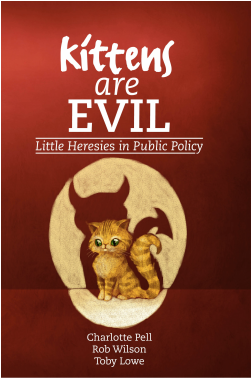|
Imprint: Triarchy Press
Published: 5th December, 2016 List Price: £15.00 Format: Paperback Extent: 100pp. Size: 15.2 x 22.9 cm ISBN: 978-1-911193-08-1 Tags: Public Sector, Public Services Kittens are Evil: Little Heresies in Public Policy Charlotte Pell, Rob Wilson, Toby Lowe |
Kittens are Evil
|

